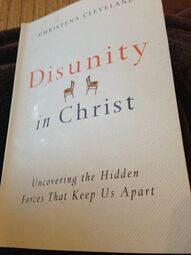I spent five years working at a multi-ethnic, multi-site congregation.
There was much I loved about this church and my role there. During my time there, I discovered who I was as a youth worker. More importantly, though, serving in a context where I was the minority forced me to wrestle with the impact my cultural identity has on my faith. This, in turn, enabled me to see and experience God from different vantage points, broaden my understanding of who God was and is, and greatly enrich my faith.
Despite this, serving in this setting was immensely difficult. We may well be “one in Christ” but the truth is, unity is hard to actually achieve.

For this reason, I wish Christena Cleveland's Disunity in Christ was in print while I was still serving in this multi-ethnic context. Though ministry still would have been hard, such a book would have given our staff and our congregation a tool for growing with and in our understanding of one another.
To be sure, this book was different than I anticipated. I expected a book focused just on racial unity. Instead, this book is relevant to the formation of unity between groups with differences of any kind. I expected a book largely centered on Christena's personal narrative. Instead, while Christena includes personal anecdotes throughout this book, it is, in reality, a book rooted in research – Christena's as well as a multitude of others. Even so, this book does not read like a stuffy academic text. Instead, it is accessible to the layman, very engaging, and extraordinarily thought-provoking.
In fact, a week after finishing Disunity in Christ, I'm still wrestling with two of Christena's ideas as well as their implications for the church:
“We dishonor the image of God in diverse people when we require them to assimilate to the dominant culture in our church, organization, or event.”
“Culture-blindness is simply disunity disguised. It falls short of the unity to which we have been called.”
As I've continued wrestling with these ideas, one thing I've grown to appreciate about Christena's work is that she offers practical starting points for putting these principles into action. I could talk for days about these as well as the rest of the content of this book.
Having said that, though, the best endorsement I can give this book is to confess that when I left the multi-ethnic, multi-site congregation I described above, I was deeply discouraged, uncertain as to whether or not it was actually possible to achieve cross-cultural unity in a church setting today. After reading Christena's book, I am, however, once again hopeful that such unity is not only possible but imperative for the church.
After all, “cultural differences in the body of Christ enable different types of people to draw near to the heart of Jesus.”
Maybe that's why Jesus intentionally and seriously prayed for unity for his followers in John 17.
Maybe that's why we, as his followers, should be serious about it, too.
Books like Disunity in Christ will help us do just that.